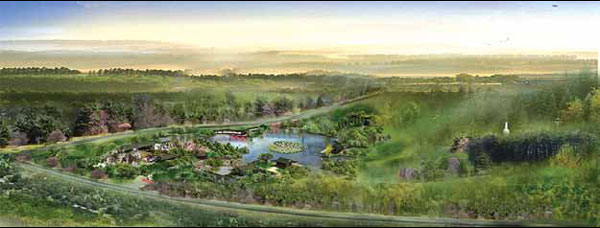
The blueprint of the National China Garden to be installed at the US National Arboretum in Washington DC. Provided to China Daily
A classical Chinese garden will be installed at the US National Arboretum in Washington DC, in a joint collaboration between China and the United States.
Featuring a series of open pavilions, a pond and traditional Chinese buildings with Ming (1368-1644) and Qing (1644-1911) style furnishings, the garden will showcase Chinese flora and landscaping, and will be open to the public.
"Our goal is to create a symbol of good will between China and the US, and to strengthen the platform for US-China relations," says Bob Stallman, president of the National China Garden Foundation.
"A large part of the US population still doesn't understand much about Chinese culture, and this will be an opportunity to see the beautiful tranquility of a Chinese classical garden, and be exposed to a sampling of Chinese arts and culture."
Although the project was initiated in 2004 as the result of an agreement between the US Department of Agriculture and China's Ministry of Forestry, plans stalled for several years.
In 2008 the new Farm Bill authorized the Secretary of Agriculture to proceed with private fund-raising for the garden, and in 2011, China's former ambassador to the US, Zhang Yesui, and US Secretary of Agriculture Tom Vilsack signed an updated Memorandum of Understanding.
The National China Garden Foundation is currently finalizing design plans, and is in talks with potential donors and sponsors for the garden, which will be entirely privately funded. For the garden to begin construction, the foundation will need to raise $60 million. If all goes according to plan, the garden will open in 2016, Stallman says.
The land, utilities and infrastructure for the garden will be donated by the US government; the Chinese government will provide 22 structures, labor, landscaping and rockeries for the garden, which will be shipped to the US and assembled on site.
The Chinese design team, led by professor Peng Zhenhua of the Chinese Academy of Sciences, is working with the USDA and the National Garden Foundation to create a garden that will stay true to the classical Chinese garden style, while catering to Western audiences, Stallman says.
"One of our priorities and issues in design is the conflict between a traditional Chinese garden, and how the garden will actually be used," he says. He notes that Chinese gardens have traditionally been for private use by wealthy individuals.
"That's a natural conflict, but the trade-off is important because ultimately our goal is to have as many people as possible able to enjoy all the elements of a Chinese garden. We don't want an overwhelming Disneyland experience. We're really hoping to offer something more intimate."
A meeting between the Chinese design team and a US architecture firm is expected to take place in early July to coincide with the US-China Strategic and Economic Dialogue, Stallman says.
Although there are a number of other classical Chinese gardens in the US - at locations including the Metropolitan Museum of Art in New York; Overfelt Garden in San Jose, California; and Huntington Library in San Marino, California - Stallman believes that the National China Garden will be particularly noteworthy for its design elements, which are inspired by famous gardens in the cities of Suzhou and Yangzhou.
The garden will also offer cultural and educational programming, Stallman says. An on-site exhibition hall will also provide a venue for official visits and business events. Additionally, the National Arboretum will likely utilize the garden for some of its research on plant genetics.
"Chinese gardens are truly beautiful, and they create a different mindset that you don't get as much with US-style gardens," Stallman says. "Ultimately, we recognize that it's important for us to maintain the cultural links that create an atmosphere in which the US and China can collaborate as much as possible."
kdawson@chinadailyusa.com
